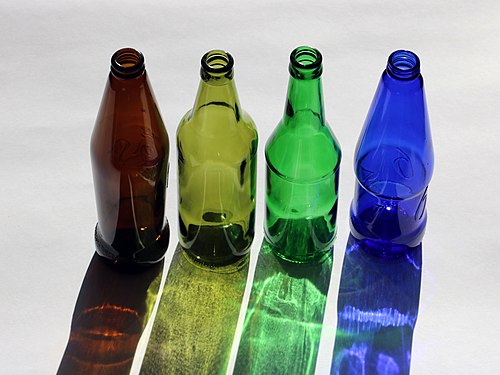Amphoranoun
A two-handled jar with a narrow neck that was used in ancient times to store or carry wine or oil.
Amphoranoun
One of various units for measuring liquid or volume during the Roman Empire, measuring between 18.5 and 39 litres depending on the variant.
Amphoranoun
Ancient unit of volume, for the measurement of the internal capacity of a ship.
Amphoranoun
In botany, the lower valve of the fruit that opens transversely.
Amphoranoun
Among the ancients, a two-handled vessel, tapering at the bottom, used for holding wine, oil, etc.
Amphoranoun
an ancient jar with two handles and a narrow neck; used to hold oil or wine
Amphora
An amphora (; Ancient Greek: ἀμφορεύς, amphoreús; English plural: amphorae or amphoras) is a type of container with a pointed bottom and characteristic shape and size which fit tightly (and therefore safely) against each other in storage rooms and packages, tied together with rope and delivered by land or sea. The size and shape have been determined from at least as early as the Neolithic Period.
Bottlenoun
A container, typically made of glass or plastic and having a tapered neck, used primarily for holding liquids.
Bottlenoun
The contents of such a container.
Bottlenoun
A container with a rubber nipple used for giving liquids to infants, a baby bottle.
Bottlenoun
Nerve, courage.
Bottlenoun
A container of hair dye, hence with one’s hair color produced by dyeing.
Bottlenoun
(obsolete) A bundle, especially of hay; something tied in a bundle.
Bottlenoun
(figurative) Intoxicating liquor; alcohol.
Bottlenoun
(printing) the tendency of pages printed several on a sheet to rotate slightly when the sheet is folded two or more times.
Bottlenoun
A dwelling; habitation.
Bottlenoun
A building; house.
Bottleverb
(transitive) To seal (a liquid) into a bottle for later consumption. Also fig.
Bottleverb
To feed (an infant) baby formula.
Bottleverb
To refrain from doing (something) at the last moment because of a sudden loss of courage.
Bottleverb
To strike (someone) with a bottle.
Bottleverb
To pelt (a musical act on stage, etc.) with bottles as a sign of disapproval.
Bottlenoun
A hollow vessel, usually of glass or earthenware (but formerly of leather), with a narrow neck or mouth, for holding liquids.
Bottlenoun
The contents of a bottle; as much as a bottle contains; as, to drink a bottle of wine.
Bottlenoun
Fig.: Intoxicating liquor; as, to drown one's reason in the bottle.
Bottlenoun
A bundle, esp. of hay.
Bottleverb
To put into bottles; to inclose in, or as in, a bottle or bottles; to keep or restrain as in a bottle; as, to bottle wine or porter; to bottle up one's wrath.
Bottlenoun
glass or plastic vessel; cylindrical with a narrow neck; no handle
Bottlenoun
the quantity contained in a bottle
Bottleverb
store (liquids or gases) in bottles
Bottleverb
put into bottles;
Bottle
A bottle is a narrow-necked container made of an impermeable material (clay, glass, plastic, aluminium etc.) in various shapes and sizes to store and transport liquids (water, milk, beer, wine, ink, cooking oil, medicine, soft drinks, shampoo, and chemicals, etc.) and whose mouth at the bottling line can be sealed with an internal stopper, an external bottle cap, a closure, or a conductive using induction sealing. Some of the earliest bottles appeared in China, Phoenicia, Crete, and Rome.






























